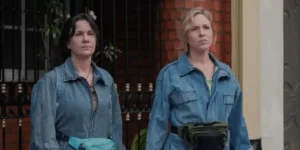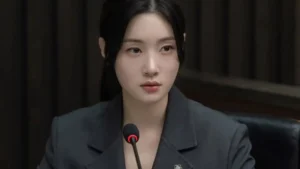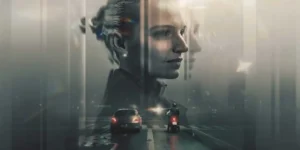Summary
British supernatural horror taking place largely in France towards the end of World War II, alternately tense and quite a rush.
Ghosts of War is an uncommonly atmospheric and clever film. I watched it on the edge of my seat, while mentally just sitting back to take everything in, and then a time came when writer/director Eric Bress grabbed my comfy chair and spun it right round. I had thought I was excusing a few odd, minor flaws because I was so engaged with the story, but it turns out those weren’t flaws after all.
(There were a couple of other flaws, but never mind those for now.)
Five jaded American soldiers receive orders to look after a French chateau before the Nazis could return to try and claim it again. They arrive a day late to relieve another small party, who are simply itching to leave the place. But our team is relieved to put their feet up, at last, look forward to real beds, and enjoy a reasonably stocked kitchen… until they start to hear inexplicable noises and see some very sinister shadows.
Eric Bress wrote two of the Final Destination films, but – despite what my description may suggest – there is nothing hammy about the horror; nor, indeed, anything exaggerated about the gory images. There are ghosts, curses, and spooks aplenty in Ghosts of War, but the majority of said gory images are due to the horrors of war itself, rather than anything supernatural. We get to know the band of soldiers and see just enough of life in their uncomfortable shoes to feel their anxiety with them after the first night in that chateau, and sympathize when none of them quite know how to talk about it the next day.
Bress was also responsible for The Butterfly Effect (the only film he has directed until now), and that may give you a better idea of the style to expect: tense, rather than exciting; and protagonists who refuse to give in to hopelessness. The main protagonists are a believable bunch, who support each other, regardless of how well they get along. They are Chris (Brenton Thwaites, Titans), Kirk (Theo Rossi, Luke Cage), Tappert (Kyle Gallner, Veronica Mars), Eugene (Skylar Astin, Zoey’s Extraordinary Playlist) and Butchie (Alan Ritchson, Blue Mountain State). They have all seen a bit too much war for anyone’s good (most notably Tappert, through whom Galler seems to channel a tightly wound Matthew McConaughey), but none are either slackers or squeaky clean patriots.

So in case it’s not obvious, I admired Ghosts of War a lot; and I’m not even sure why I went for it, as war films as a rule are not for me (perhaps it’s because I got a lot out of Overlord). The flaws that got to me though were around the explanation of what was going on in the story and the ending in general. I felt that things were explained a little too thoroughly and in a rush (a bit like some have said about Hereditary, though I don’t quite agree there). And yet the ending itself was not as decisive or as clear as it could have been. These issues are kind of fundamental, but they weren’t deal-breakers by any means: the quality of the rest of the film was still with me after the credits had faded away.
The atmosphere was simply that strong. Mike Suby’s music was a major contributor: somewhere between subtle and “classic haunted house”, and never trying too hard to be retro. The use of sound, in general, was very effective: sometimes, if the five soldiers just heard tapping from an upstairs room that was enough to feel their fear. The few genre tropes that were used were mild, and used to good effect, never teasing or gratuitous. Lorenzo Senatore’s cinematography was also spot on. I had expected it to be too gloomy but there was enough daylight to contrast well with the nighttime interior scenes. He also managed to capture the soldiers’ confusion and claustrophobia with the camera.
I should warn you that Ghosts of War is a distinctly grown-up film: I have no argument with its R rating. It’s a psychological horror film set in wartime, so of course, nasty things happen, and some of those nasty things are shown on screen. Towards the end, there was even one image that encapsulated the “real horror” of war, so that everything before it lost meaning for a moment. And interestingly, there was very little judgment in Ghosts of War: the five young Americans had plenty of opportunities to declare hatred against the evils of Nazism, etc, and they did debate (inconclusively) the nature of evil at one point. The enemy was not evil, in this film, but rather war itself and what it can do to people.
That said, Ghosts of War is not heavy going throughout. It also features Billy Zane…




